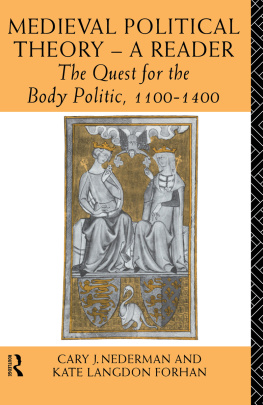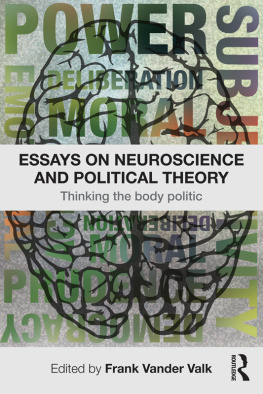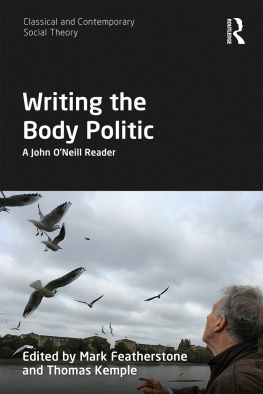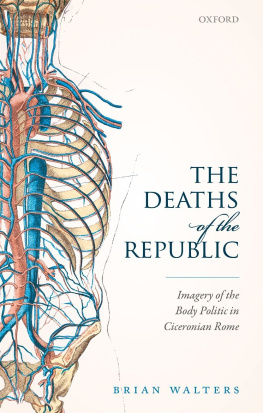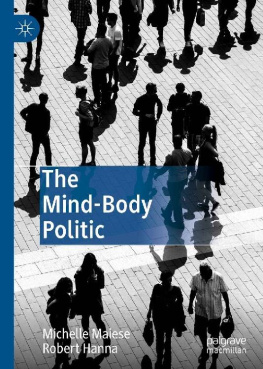Acknowledgments
The good of the whole derives from the contribution of many discrete parts. The genesis and publication of this collection rests upon the generosity and support of many individuals whom we would like to acknowledge: first and foremost, the contributors to this volume, who patiently attended to our questions and requests while assembling and editing their chapters. Their deep appreciation of Shakespeare and his works is evident in their contributions, here and elsewhere. We have learned much about Shakespeares political wisdom from reading their chapters.
Most of the chapters in this volume were drafted by the contributors for presentation at a three-day conference on Love and Honor in Shakespeare held at Assumption College in the fall of 2009. For considerable institutional and financial support that made possible that event, we would like to thank the Office of the Provost at Assumption College. Shorter versions of the four chapters by Joseph Alulis, Bernard J. Dobski, Dustin Gish, Peter Meilaender, and Timothy Spiekerman appeared in a special issue on the political thought of Shakespeare in Perspectives on Political Science (Vol. 40/4, 2012). We genuinely appreciate the willingness of Peter Lawler, the editor of Perspectives, to broaden the academic scope of political science as a discipline by steadfastly supporting those who work in the fertile fields of political philosophy and politics and literature. Taylor and Francis Publishing has generously granted permission for the use of these shorter articles in the extended versions written for this volume. For their interest in the subject, and their assistance in preparing the manuscript for publication, we have enjoyed the abiding support of the editorial staff at Lexington Books. Lenore Lautigar and Alissa Parra patiently awaited its final delivery and contributed with their suggestions to its improvement. Josie Brown deserves special thanks for her meticulous work in assembling the index. For their help in creating the cover image, we thank the Graphics Department at the College of the Holy Cross, and especially Sharon Matys. The scanned image of the frontispiece of Hobbess Leviathan (1651) was provided by the Mortimer Rare Book Room, Smith College.
Finally, we would like to acknowledge a special debt of gratitude owed to our teachers, especially those who first introduced us to the task of reading Shakespeares works in search of political wisdom: John Alvis, George Anastaplo, Leo Paul de Alvarez, and David Lowenthal. Through their courses and writings, they have inspired in generations of students (many of whom have become teachers and scholars of Shakespeare themselves) an extraordinary appreciation of the profound political depths of Shakespeares plays and poetry. It would be inaccurate, however, to claim that they presented themselves as teachers (not to mention professors) of Shakespeare. Any honest reader of his works must suspect that you cannot teach Shakespeare any more than you can teach love, or friendship, or human nature. The experience of reading Shakespeare educates us. A sustained and deliberate study of Shakespeare has its rewards, which are shared by teachers and students alike as readers. A few have admirably carried torches for others who have gratefully followed, and they have done so for decades without their lights ever becoming dim. They have helped usand continue to help usto recognize that Shakespeare humanely extends an invitation to any serious reader of his works to ponder the political wisdom conveyed therein. We have been guided in our readings of Shakespeare by the example of such admirable teachers, for whom we are grateful and to whom we dedicate this volume.
Preface
Metaphors animate Shakespeares corpus, and one of the most prominent metaphors that we discover at work in his plays and poetry is the image of the body. Sketched out in the eternal lines of his writings, and often drawn in exquisite detail, variations on the body metaphor abound in the works of Shakespeare. Indeed, it is with a deliberate eye to this metaphor that the editors of the First Folio fashioned the dedication at the head of that seminal volume, invoking the bodily diversity, material imperfection, and yet looked-for resurrection of the author within the printed pages of this earliest collection of Shakespeares plays. Heminge and Condell offered to most humbly consecrate... the remains of your servant Shakespeare by enclosing his body of plays in a fitting monument of remembrance. Having done an office to the dead by gathering together the several parts of Shakespeares discrete plays into a whole, they intended to produce a book that would survive and transcend his death, a work meant to keep the memory of so worthy a Friend and Fellow alive. By way of this extended metaphor playing on the image of the bodyits discrete parts as well as unity, its inevitable mortality as well as its prospects for metaphorical immortalityShakespeares first editors showed their gratitude both to the living, and the dead. So too, it is through this same image of the body, both the human body and the body politic, as refracted by the lens of political philosophy, that the present editors have attempted to gather the essays herein within the covers of a single volume. Shakespeare and the Body Politic limns the shape of this paradigmatic metaphor so dominant in the history of political thought.
Let us clarify, however, what the reader will not find in this volume. The contributors to this volume have not followed the lead of much contemporary scholarship on Shakespeare in its effort to situate (and so confine) Shakespeares work within the reigning social, political, moral, and religious views of his day. The authors are attentive to the political thought exhibited within and interrogated by the plays, and one long poem, that they study. While there is an occasional nod to the context of Elizabethan culture and politics, the chapters herein undertake a more direct approach to understanding what Shakespeare has to teach us about our lives as human beings and citizens. Political context and political actorswhether princes, statesmen, nobles, clergymen, or commonerscome to sight in and inform the arguments developed in these essays. There is, we hope, a freshness and immediacy in an approach that endeavors to draw political wisdom directly from Shakespeares seemingly bottomless well. By taking Shakespeare and his works seriously as an education in human and political virtue, readers and audiences at all times and in all places can find themselves written into his pages: Shakespeares sovereign body of work is politic and incorporates us all within it. (It is this thought, among others, that the cover image of the present volume seeks to evoke.) This undoubtedly helps explain the perennial fascination with and attraction to his magisterial corpus.
But Shakespeares corpus is too vast and the political wisdom it contains too comprehensive for any one scholarly work to explore sufficiently. We offer instead a narrower focus in the present volume. As we argue in the opening chapter, Shakespeares plays and poetry are both timely and timeless because his work prompts thinking about The Body Politic, perhaps the most vivid and enduring image in speech describing political community ever proposed. His contemporary political relevance becomes evident when we reflect on the challenges posed to liberal democracy, especially those challenges that arise from within that form of government and regime itself. With reference to Shakespeare, we address the progressive vision of those who see the limitless extension of individual rights as an unproblematic proposition and who view the nation-state as the obstacle to a more just worldan obsolete, if not barbaric relic obstructing the progress of reason and humanity. In opposition to the universal aim of popular humanitarianism, Shakespeares plays and poetry do not seek to transcend the enduring necessity of a body politic, the particular, bounded, and exclusive political orders that contain us in a given time and place. To watch or read a dramatic work of Shakespeare we cannot help but enter into a political realm: ancient Greece and Rome, pre-historical and historical Britain, modern Italian city-states. With rare exceptions, the action in Shakespeares dramatic works always unfolds within the boundary of an established body politic. We discover therein individual figures who, as constituent parts of some larger whole, inevitably act as citizens or subjects as well as human beings. They grant and withhold their consent, exercise and enjoy or pursue their rights, and even struggle to make sense of their private lives as lovers, rivals, heroes, and villains, all while playing their parts on a stage that is circumscribed by a particular regime or political form. The sentiments and consequences of familial affection or romantic love, the longed-for blessings of peace and prosperity, the desire for justice and vengeance, and the spirited pursuit of honor and glory cannot be conceived apart from the limits of the body politic.



